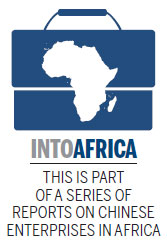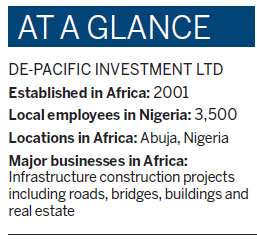Chinese firm targets Nigerian float
By Li Lianxing in Abuja, Nigeria (China Daily Africa) Updated: 2014-06-27 09:16
|
Workers on a De-pacific Investment road construction project in Kano state, northern Nigeria. Provided to China Daily |
Medium-sized private company aims to raise capital and deepen local involvement in the business
A construction and engineering company says it plans to become the first privately owned Chinese firm to sell shares to the public on the Nigerian stock market.
De-pacific Investment Ltd has a pipeline of 14 infrastructure projects across six states of the country, including roads, bridges and office buildings.
Its chairman, Wang Zhongqi, says the possible listing could further ease what has been a problem for it and many other private companies expanding in Africa - lack of funding.
With contract values last year worth around $100 million, Wang says De-pacific is confident of raising enough capital on the Lagos-based Nigerian Stock Exchange to continue what has been impressive growth.
A float would also help with what he says is the most crucial aspect of a successful operation in Nigeria - being able to demonstrate that you are fully committed to localization.

"Going to the Nigerian stock market means we would be sharing our company with local shareholders, which in my view is the most localized way of doing business," he says.
"We can also use it as a good chance to improve our performance and adapt to a more competitive market in the future."
The idea of a float was first discussed by Wang and his management team five years ago, but it has taken longer than expected to get to the position where they can consider kick-starting the process.
He says the Nigerian construction sector has strict local quality control conditions under which companies can effectively bid for the bigger government contracts.
"But give us another three to five years, and we could be the first [Chinese company] to list."
As of December 31, the Nigerian stock market had about 200 listed companies with a total market capitalization of around $80.8 billion. All listings are included in the Nigerian Stock Exchange All Shares index.
Wang says government investment in infrastructure still holds the key to future African development, but that in the past successful tendering for those contracts had been the reserve of mainly larger operators, which often had the backing of larger parent organizations with deeper pockets.
"The entry point has often been too high for many, in terms of the financial investment in equipment and employees needed.
"However, by using smart, tailored strategies, a medium-sized private company like ours from China has been able to start taking a share, and make itself more sustainable to compete in the long run."
Wang predicts that African infrastructure construction will continue to mushroom for the next 20 to 30 years.
"In the 1990s, when I first landed here, people were still quarreling about which political system to follow - but now the consensus is that urban development is the key to the future, and, of course, infrastructure is the key to that.'
"And when the next generation of technocrat politicians comes to power in a few years, development will be the national priority."
As a private company, Wang says, De-pacific Investment's progress in the Nigerian construction sector has been financially challenging, given the capital expenditure pressures of new equipment, and hiring the best talent available.

"Unlike state-owned companies, which have powerful financial backers in China, we had to start from scratch," he says.
"We had nothing to bring into this country, so we had to develop our own business plan to fit those difficult financial pressures."
After an initial four-year setup period, it was not until 2007 that the firm finished its first contract, a road construction project in the north of the country.
"Now we have 14 projects under construction in six locations, and we hit our target of $100 million worth of contracts last year."
The company is focusing on the real estate market. Wang says that because he did not have any serious financial backup, De-pacific grew its capacity organically.
He predicts the next five years will become more competitive as more foreign investors arrive, and as local companies become stronger.
But his efforts to localize his business, compared to other incomers, have given it a strong competitive advantage.
"Financial support is not the most important factor. It is management that is crucial. We train our employees well and have fully integrated and localized ourselves into the Nigerian market."
But localization is a lot more than just about choosing a local partner or replacing Chinese employees with Nigerians. "It is about connecting the companies' interests to local development, and hopefully attracting local shareholders."
"We have quite distinct cultural roots from local competitors, so from a business perspective it's still risky for a private company like us to largely rely on choosing a local partner.
"So we have to give more priority to training our local employees, which will allow them to build up the company's cooperation with others."
Of his 4,000 workers, 3,500 are Nigerians from all over the country, with various ethnicities and religions represented.
Jiang Pingping, secretary general of the China Chamber of Commerce in Nigeria, says De-pacific's development represents a strong business model on which other private sector companies can base their future.
"It's all about identifying the main features of a market, and tailoring your situation on the ground to suit those, rather than just accepting the competition is too tough.
"Its experience is a great example of how a business strategy can be adapted to survive, sustainably, anywhere, including Africa."
Wang first arrived on the continent in 1995, in Tanzania, with the ambition of opening a commodities business after resigning from a large state-owned company in Inner Mongolia in northern China.
"The atmosphere then in big state-owned operations was so smothering, and young people like myself found it hard to show their talent, and often their futures were limited.
"So when one of my African friends told me of the potential of the market there, I decided to give it a try."
His initial efforts, however, led to nothing, despite the massive potential in African commodities.
"Despite being told everything could be sold here, I didn't survey the market properly and knew next to nothing about it when I got there.
"But more fatally, my mentality of running a company was still too influenced by what I had learned in the state sector, and that model just didn't work at all."
Despite selling 15 container loads of goods in Tanzania in 1997, he failed to make a profit, and moved his target to Europe for two years before returning to Africa to try again.
"I chose Nigeria this time because it was one of the biggest markets in Africa. But this time I was better prepared."
He successfully started trading in shoes, tires and other commodities, and by 2003, the business was starting to grow.
"But I still felt that it was not the kind of sustainable, long-term business that a foreign investor should be in.
"I decided infrastructure was the ideal field. However, my main concern was how a private company like mine could become involved, given the huge amounts of investment needed."
But through what he calls a carefully worked out business plan, with localization at the top of his list of priorities, he made development of management skills his main focus.
"Local management is vital for a company's development, but it has to be tailored to specific situations, especially in Africa.
"There was little knowledge we could borrow from other Chinese companies in Africa, so we had to develop our own criteria, based on recognized ISO management standards."
The culmination of this could now be a stock float in three to five years, in which local cash will be raised to expand the business to the next level, while at the same time bringing in local investors.
Despite the multicultural nature of Nigeria's workforce, Wang insists that too many Chinese companies have been operating for too long under management systems developed and simply exported directly from China.
"We found that with such a complex mix of different cultures in the workforce, we couldn't rely on locals adapting to our habits, so we had to incorporate local structures into the business."
"It has been a lot more challenging than expected, and it may take a longer time yet - but we are confident the strategy has been right."
lilianxing@chinadaily.com.cn











